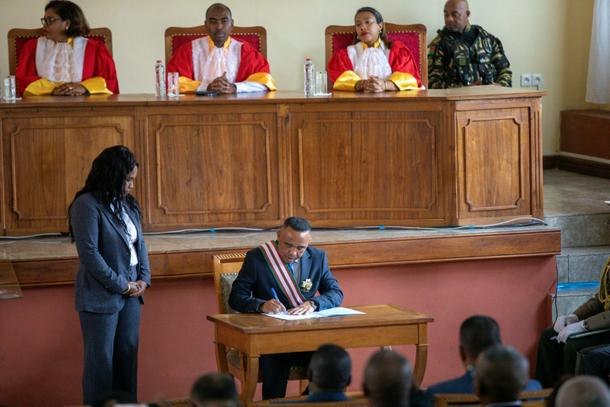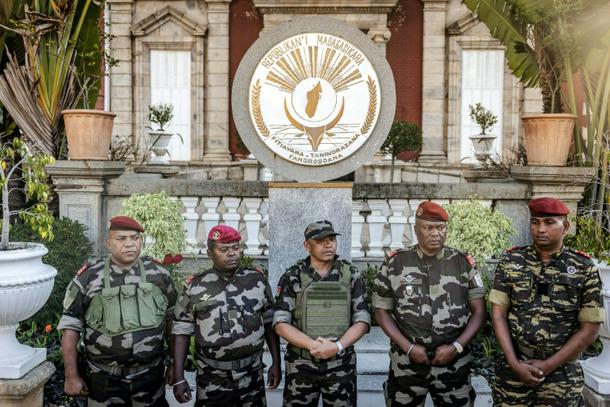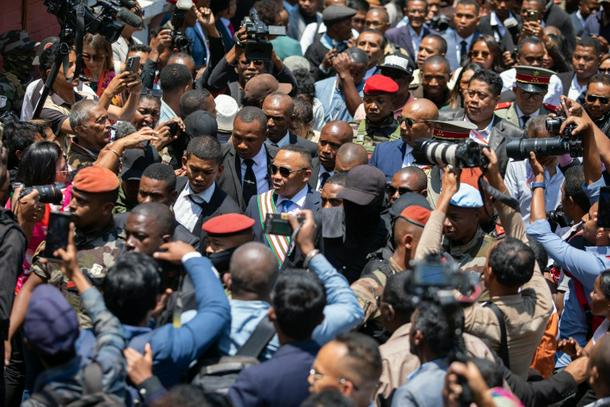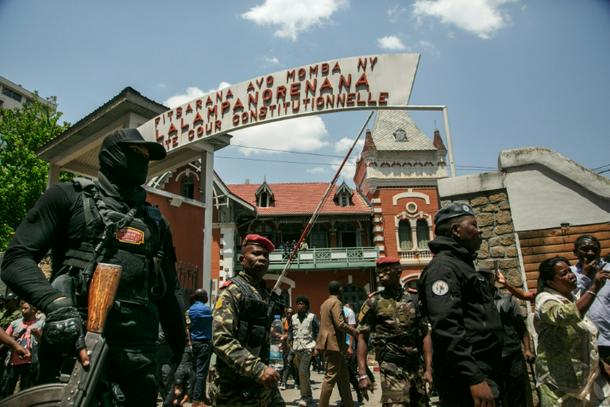
Newly sworn-in President Michael Randrianirina said his inauguration marked a historic turning point for Madagascar
Antananarivo (Madagascar) (AFP) - Army colonel Michael Randrianirina was sworn in as Madagascar’s president Friday vowing sweeping reforms, just days after the military took power following weeks of anti-government protests that sent ex-president Andry Rajoelina fleeing.
Randrianirina led the CAPSAT army unit, which mutinied and joined the anti-government protesters before announcing Tuesday that the military had taken power, after Rajoelina was impeached for desertion of duty.
“Today marks a historic turning point for our country,” Randrianirina said after his swearing-in ceremony, where the 51-year-old colonel swapped his army uniform for a suit.
He promised change in the poverty-stricken island nation, where anger over chronic power cuts sparked protests last month that swiftly escalated into a mass movement.
“We will work hand in hand with all the driving forces of the nation to draft a fine constitution… and to agree on new electoral laws for the organisation of elections and referendums,” Randrianirina said.
“Our main mission is to thoroughly reform the country’s administrative, socio-economic and political systems of governance,” he said, promising to consult young people before a new government is formed.

CAPSAT unit announced at the presidential palace that they had assumed power
He also thanked the youth for spearheading the protests that ousted Rajoelina and said the army had intervened at the request of the top court to “avoid anarchy and disorder”.
The ceremony in the capital Antananarivo was attended by military officers, politicians, representatives of the Gen Z youth-led protest movement and several foreign delegations, including from the United States, the European Union, Russia and former colonial ruler France.
Facing international criticism, Randrianirina has been eager to officialise his new role and insisted the takeover was not a coup, pointing to the constitutional court’s backing.
At his swearing-in, the new leader addressed the foreign delegations in French, inviting them to “accompany Madagascar in the process of steering and implementing national renewal”.

Randrianirina was sworn in at the country's constitutional court
Local media reported that Randrianirina had already met a Russian delegation Thursday.
The international community’s “large presence here shows that they respect national sovereignty”, he told journalists.
The European Union said it was closely monitoring events and called for dialogue to foster a return to democracy in the country.
A few dozen people gathered outside the constitutional court Friday in hopes of seeing the new president.
“We’re happy to be able to hope for change,” said shopkeeper Faniry Randrianaridoa.
“We hope, but we’ll see,” she told AFP. “It’s not a whim to want water and electricity.”
- Ex-president in hiding -
Rajoelina’s supporters have condemned the constitutional court’s support of the CAPSAT commander as riddled with procedural illegalities that risked destabilising the country.
They insist that Rajoelina remains leader and is working to find solutions to the problems dogging the country.

The power grab was the third military transition in Madagascar since independence in 1960
Rajoelina adviser Lova Rinel Rajaoarinelina told AFP Friday there was no possible recourse for the decisions that led to his impeachment.
Government forces were accused of a harsh crackdown on the protesters, with many reported dead or wounded, until CAPSAT announced on October 11 that it would refuse orders to shoot on them.
It marked a turning point in the uprising, with the unit hailed by the protest movement which now expects a role in the new set-up.
Rajoelina’s office confirmed in a statement late Wednesday that he had fled the country, although he has not revealed his whereabouts.
Media reports said the 51-year-old was evacuated on Sunday aboard a French military plane that took him to the French island of Reunion, from where he travelled to Dubai.
The power grab was the third military transition in Madagascar since independence in 1960, following coups in 1972 and 2009.
It is the latest of several former French colonies in Africa to come under military control since 2020, after coups in Mali, Burkina Faso, Niger, Gabon and Guinea.
The country, off Mozambique, is one of the poorest in the world, with about 80 percent of its 32 million people living in poverty, despite an abundance of natural resources and rich biodiversity.
The African Union and regional bloc SADC said they would send fact-finding missions to the country and called for constitutional democracy to be upheld.